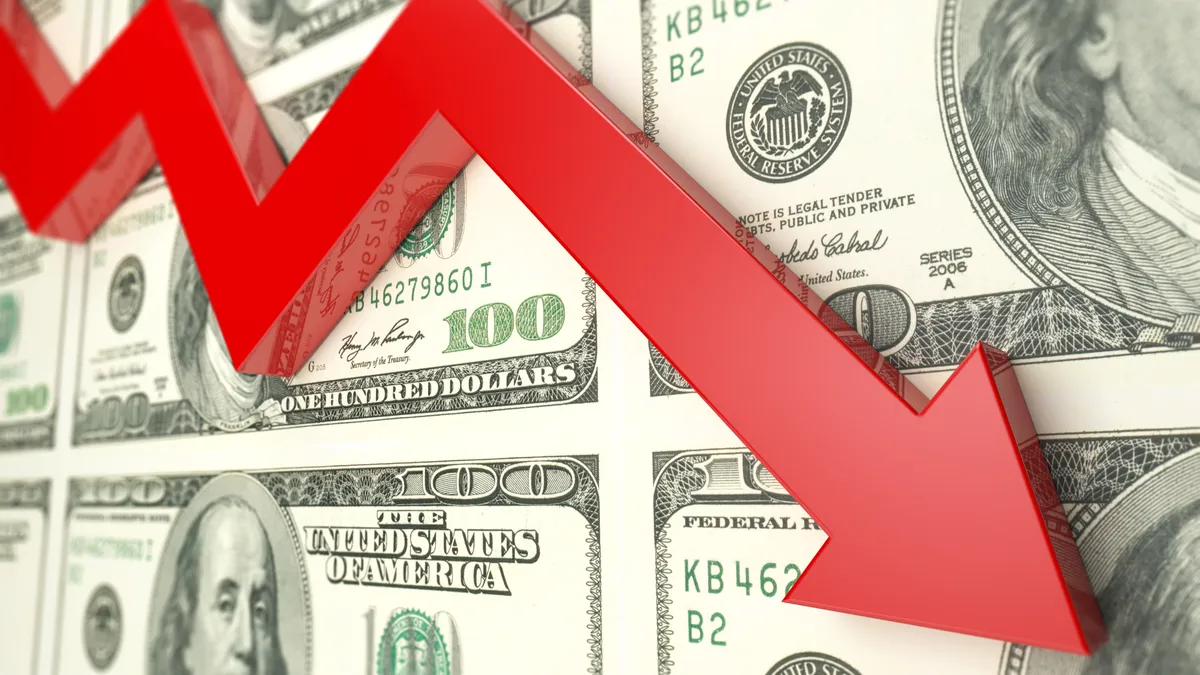Dive Brief:
- BlackRock CEO Larry Fink said Monday that the majority of CEOs he has spoken to believe that a pullback in consumer spending has pushed the U.S. economy into a recession.
- “Most CEOs I talked to say we’re probably in a recession right now,” Fink said, replying to questions at an Economic Club of New York event. The chief executive at an airline, referring to the industry as the metaphorical canary in the coal mine, said that “the canary is sick already,” Fink said.
- Even before Trump administration tariffs kneecapped equity markets, “you were starting to see more and more trepidation by consumers, more and more slowing down their purchases, slowing down their vacation plans,” Fink said. “All of this I would imagine, now with the [stock] market setback, is going to freeze more and more consumption, and then we’re going to start seeing that really quickly.”
Dive Insight:
Fink is just one of many Wall Street leading lights who, in comments Monday, flagged disruptions from tariffs recently imposed on virtually all U.S. trading partners, including a 10% baseline tariff on all imports and reciprocal tariffs ranging as high as 34% for China.
“We are in the process of destroying confidence in our country as a trading partner, as a place to do business and as a market to invest capital,” Bill Ackman, CEO of Pershing Square Asset Management, said Monday on X.
JPMorgan Chase CEO Jamie Dimon predicted that the barrage of tariffs will spur inflation and slow growth, aligning with comments by Federal Reserve Chair Jerome Powell on Friday.
Referring to a risk of retaliation and an extended trade war, Dimon said his “most serious concern is how this will affect America’s long-term economic alliances.”
JPMorgan on Friday raised the odds of a U.S. recession to 60% from 40%, following several other organizations that see a higher probability of a slowdown than a month ago.
“Significant and somewhat unprecedented forces” — including tariffs and the persistence of high stock prices even after the recent selloff — “cause us to be very cautious,” Dimon said.
While posing a risk of retaliation, tariffs may harm corporate profits, the flow of capital and the valuation of the dollar, he said.
“The quicker this issue is resolved, the better because some of the negative effects increase cumulatively over time and would be hard to reverse,” the CEO wrote. “In the short run, I see this as one large additional straw on the camel’s back.”
Bill Dudley, a non-executive director at Swiss Bank UBS and former president of the New York Fed, said Monday that the blitz of import duties poses a risk of inflation and recession.
“The president’s attack on free trade is truly extraordinary in scope, scale and lack of nuance,” Dudley said in an opinion piece for Bloomberg, estimating that the weighted average of tariffs will surge to at least 25% of the value of imports this year from less than 3%.
“The impact will be devastating,” Dudley said, predicting that inflation will rise to nearly 5% even though consumers will cut spending to adapt to the equivalent of a $600 billion tax hike.
“All told, stagflation is the optimistic scenario,” he said. “More likely, the U.S. will end up in a full-blown recession accompanied by higher inflation.”
Gross domestic product growth will probably shrink at a 2.8% annual pace during the first quarter, the Atlanta Fed forecast on April 3, the day President Donald Trump announced sweep import duties.
“The economy is weakening as we speak,” Fink said, calling on the Trump administration to follow through on promises of deregulation and an extension of tax cuts enacted in 2017.
“In coming months we’re going to see more evidence of a slowdown in this economy,” he said. “Investors are going to have to continue to price that in, whether that’s economic growth, whether it’s less consumption.
Howard Marks, co-chairman of Oaktree Capital, criticized the scuttling of the post-World War II trade order in an interview on Friday with Bloomberg Television.
“We’ve gone from free trade and world trade and globalization to this system, which implies significant restrictions on trade in every direction and a step toward isolation for the United States,” he said.
Stan Druckenmiller, former chair and president of Duquesne Capital, was more terse. “I do not support tariffs exceeding 10%,” he said on X.














